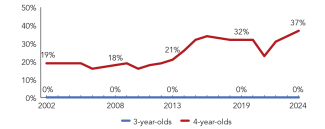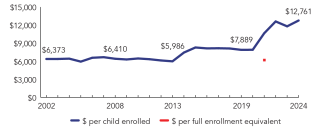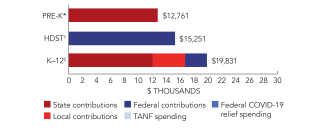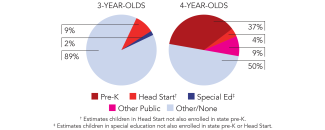
State of Preschool
Michigan
Access Rankings
Resource Rankings
Total Benchmarks Met
Overview

During the 2023-2024 school year, Michigan Great Start School Readiness (GSRP) enrolled 41,120 children, an increase of 2,980 from the prior year. State spending totaled $524,720,000, up $74,842,159 (17%), adjusted for inflation, since last year. State spending per child equaled $12,761 in 2023-2024, up $965 from 2022-2023, adjusted for inflation. Michigan met 10 of 10 quality standards benchmarks.
What's New

As of December 1, 2023, GSRP moved to the newly created Michigan Department of Lifelong Education, Advancement, and Potential (MiLEAP) created by the Governor under Executive Order 2023-6. State funding for GSRP increased as federal recovery funding that was previously used to expand GSRP ended. The GSRP per child funding rates increased again, up to $9,608 for a full-day slot, matching the base foundation allowance of K–12. The income eligibility for GSRP increased from 250% to 300% FPL in 2023-2024.
In September 2024, Michigan was one of 10 states and D.C. awarded a 3-year federal renewal Preschool Development Grant B-5 (PDG B-5) totaling $8,999,241 annually. The PDG B-5 renewal grant is intended to carry out the strategic plans developed with the 2023 planning grants which focused on addressing the workforce, social-emotional well-being, and sustainable infrastructure in the state’s early childhood system.
Background
Established in 1985, the GSRP, formerly known as Michigan School Readiness Program, provides preschool education for at-risk 4-year-olds, and is associated with the state’s early childhood initiative. Starting in 2013-2014, 90% of families had to be at or below 250% FPL with some exceptions for up to 300% FPL. In 2021-2022, up to 15% of children could be over the income threshold, up from 10%. Beginning in 2023-2024, 85% of children must be in families up to 300% FPL. Any family over-income must pay a fee on a locally determined sliding scale unless they are homeless, in foster care, or have an IEP recommending placement in an inclusive preschool setting. GSRP serves the majority of children in school-day programs. Intermediate School Districts (ISDs) serve as program grantees, but they may distribute funds to local school districts and to providers in community based settings to offer GSRP. GSRP providers must attain a three-star or higher rating in Michigan’s Great Start to Quality (GSQ) tiered rating and improvement system. In Winter 2023, Michigan’s GSQ system was updated to be more provider friendly and moved away from star ratings. GSRP providers must now be an equivalent to enhanced quality within the new naming convention. Overall ISD funding is determined by the level of poverty in each ISD and a funding formula, with final grantee awards based on a community needs assessment and a formula component. State funding includes a transportation fund, a curriculum/training fund, a Start Up Grant Fund, and funding to recruit families and increase public awareness of GSRP; as well as $600,000 for ongoing statewide evaluation activities.
Michigan’s Developmental Kindergarten (DK, not included in this report) is the first year of a planned two-year kindergarten program sequence for children who turn five between September 2 and December 1 or whose parents and/or schools feel they are “not ready” for kindergarten, usually those with birthdays between July and September 1. It is funded in the same way as kindergarten using the school funding formula and follows kindergarten requirements, which are based on local district control. DK enrolled 9,618 four-year- olds with $92,409,744 in total spending in 2023-2024. Michigan’s Strong Beginnings is a pilot state-funded center-based preschool program for three-year-olds. In 2023-2024, 392 three-year-olds participated in the program with $6 million in state school aid funding.
Michigan Great Start Readiness Program
Access
Resources
| Total state pre-K spending | $524,720,000 |
| Local match required? | No |
| State Head Start spending | $0 |
| State spending per child enrolled | $12,761 |
| All reported spending per child enrolled* | $12,761 |

*Pre-K programs may receive additional funds from federal or local sources that are not included in this figure. †Head Start per-child spending includes funding only for 3- and 4-year-olds. ‡K–12 expenditures include capital spending as well as current operating expenditures.
Michigan Quality Standards Checklist
| Policy | Requirement | Benchmark | Meets Benchmark? |
|---|---|---|---|
For more information about the benchmarks, see the Executive Summary and the Roadmap to State pages. | 10*benchmarks met | ||
| Early Learning & Development Standards Benchmark | Comprehensive, aligned, supported, culturally sensitive | Comprehensive, aligned, supported, culturally sensitive | |
| Curriculum Supports Benchmark | Approval process & supports | Approval process & supports | |
| Teacher Degree Benchmark | BA* | BA | |
| Teacher Specialized Training Benchmark | ECE, CD, ECE SpEd | Specializing in pre-K | |
| Assistant Teacher Degree Benchmark | CDA or AA in ECE/CD | CDA or equivalent | |
| Staff Professional Development Benchmark | 16 hours/year; PD plans; Coaching | For teachers & assistants: At least 15 hours/year; individual PD plans; coaching | |
| Maximum Class Size Benchmark | 18 (4-year-olds) | 20 or lower | |
| Staff to Child Ratio Benchmark | 1:8 (4-year-olds) | 1:10 or better | |
| Screening & Referral Benchmark | Vision, hearing, health & more | Vision, hearing & health screenings; & referral | |
| Continuous Quality Improvement System Benchmark | Structured classroom observations; Data used for program improvement | Structured classroom observations; data used for program improvement | |
* Indicates that while policy meets the benchmark, it is not being implemented fully
